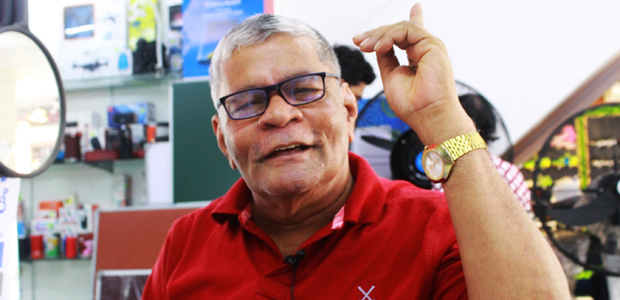In Conversation with Alhaj Mohammed Saqaf Mohammed Fawzi
Harmony, the weapon to defeat terrorism
Seventy years after our independence, what have we achieved? Look at India now. Mahatma Gandhi, Sri Nehru and Mohammed Ali Jinnah achieved independence by hard work and great sacrifice. This is not the case in our country.
National unity is certainly the weapon that can defeat extremism, and it is the duty of the entire nation to understand their responsibility in cultivating it, says Alhaj Mohammed Saqaf Mohammed Fawzi, a key link in the social and political field of Sri Lanka. This is his interview with The Catamaran.
Though he was born in Dharga Town, Beruwala, was sent to live with his businessman father in Anuradhapura to control his mischief. After studying Sinhala schools, he became a full-time member of a leftist political camp. He has been serving as the President of the Jumma Mosque in Anuradhapura for 25 consecutive years and is now retired. Alhaj Mohammed Saqaf Mohamed Fawzi, is now 68 and a prominent businessman in Anuradhapura and a member of many organizations.
THE CATAMARAN – What do you feel is the current situation in the country after the Easter Sunday attacks?
Muslims in this country are suffering a big wound that has not been healed yet. They played no part to cause this injury. Doubt is the root cause. Elimination requires a long term and well sustained treatment. It is possible that a tiny past of the Muslim community helped the terrorists. But today, the entire Muslim community is facing various difficulties. The main reason for this is lack of respect towards major Sinhalese culture in the country, along with a lack of understanding of other religions. Living in isolation in terms of area and ethnicity is a major contributing factor to this problem. For instance Kanthankudy is a purely Muslim area and Jaffna is a totally Tamil populated area.
A mixed society and mixed marriages can end this situation. When I was President of the Grand Mosque, I opened it to all communities and different religious people through the Citizens Committee. Similarly our people also engaged in various other religious festivities. Thus we were able to get the Anuradhapura Muslims to understand the other religions. The Qur’an belongs not only to the people of Islam but to the whole world. Anyone can read it and understand. Anybody can join the religion if they wish. There is no compulsion. Everyone is free to practice their own religion, as long as there is consideration towards the other religions. That is the meaning of Islam. When a Thawheed Jamath mosque was built in Anuradhapura I fully opposed it and had to face problems due to it.
THE CATAMARAN- Today Muslim women face problems because of their attire. How do we address this?
Their attire is a fashion. In recent years, people travelling to the Middle East, especially Muslim women, have dressed in different outfits, such as the Abaya. Our mothers were good Muslim women even though their dress was very simple and ust like Mrs. Indira Gandhi, a small piece of cloth was used to cover their heads. In the Middle East, the women dressed the way they do to protect themselves from the heat and desert dust when travelling on camels. Do we have camels rides here? Communities should adapt to suit the culture of the country.
THE CATAMARAN- What are your suggestions for harmonious coexistence of all ethnicities?
Seventy years after our independence, what have we achieved? Look at India now. Mahatma Gandhi, Sri Nehru and Mohammed Ali Jinnah achieved independence by hard work and great sacrifice. This is not the case in our country. During the 70 years there was no service from the politicians to the country. Mixed schools are essential. Tamils and Muslims must learn Sinhala. Language is one of the most important weapons of reconciliation. If we are armed with this weapon there would be no problems in this country..
At present, every reconciliation project is carried out in major cities. The achievements are few. Many villagers live in isolation from the towns. They get very little accurate information. There should be reconciliation programs targeting different religions and ethnicities beyond the cities.
Investigations into the Easter Sunday attacks need to be carried thoroughly to avoid the recurrence of such incidents. The Muslims and Sinhalese are two communities with long standing friendships. Due to the actions of a few extremists this friendship cannot be allowed to decay. It is the duty of the leaders to provide them with proper leadership for that. This is what you call real freedom. Extremism can certainly be defeated by national unity.










